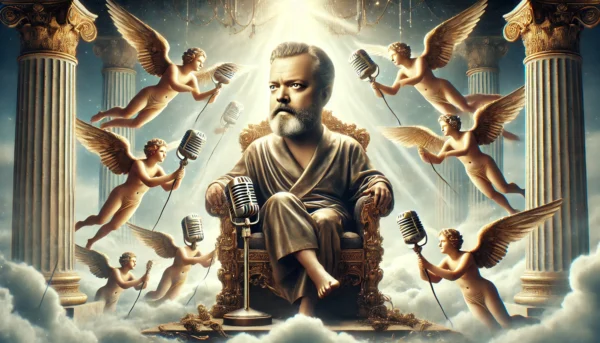An AI Performative Interpretation
Ladies and gentlemen, gather ’round, for I shall regale you with a tale most extraordinary – the story of a voice that shook the airwaves, captivated audiences, and left an indelible mark on the world of entertainment. That voice, dear listeners, is my own.
The Early Years: A Voice Emerges
Born on May 6, 1915, in Kenosha, Wisconsin, I was christened George Orson Welles. From an early age, it became apparent that I possessed a certain… shall we say, vocal distinction. My mother, a concert pianist, and my father, an inventor and businessman, nurtured my talents, though they could scarcely have imagined the heights to which this voice would soar.
As a young man, I found myself drawn to the stage, where my resonant tones first echoed through the hallowed halls of theater. But it was in the realm of radio where my voice truly found its home, and where I would soon make history.
The War of the Worlds: A Nation in Panic
Ah, October 30, 1938 – a date that shall live in infamy, or perhaps in creative brilliance, depending on one’s perspective. On that fateful evening, I took to the airwaves with our Mercury Theatre on the Air, presenting an adaptation of H.G. Wells’ “The War of the Worlds” that would forever change the landscape of radio drama.
Picture, if you will, a nation huddled around their radio sets, expecting the usual fare of music and light entertainment. Instead, they were greeted by my voice, grave and urgent, delivering news bulletins of an alien invasion. “Ladies and gentlemen, we interrupt our program of dance music to bring you a special bulletin from the Intercontinental Radio News,” I intoned, setting the stage for what would become a nationwide sensation.
As the broadcast unfolded, weaving a tale of Martian cylinders crashing to Earth and heat-rays decimating the countryside, panic began to grip the nation. Listeners, believing the events to be real, flooded the streets, called loved ones, and prepared for the worst. It was a testament to the power of radio, and dare I say, to the persuasive qualities of my own voice.
The aftermath of the broadcast was nothing short of chaotic. Newspaper headlines screamed of the panic, authorities demanded explanations, and I found myself at the center of a media storm. “I simply couldn’t imagine that people would believe the broadcast,” I later explained, perhaps with a hint of disingenuousness. For in truth, dear listeners, we had tapped into something primal – the fear of the unknown, and the willingness to believe in the extraordinary when presented with conviction.
The Golden Age of Radio: A Voice in Its Prime
The success of “The War of the Worlds” catapulted me to new heights of fame, and my voice became a fixture on the airwaves. With the Mercury Theatre on the Air, we brought literary classics to life, from “Dracula” to “A Tale of Two Cities.” Each production was a canvas upon which I could paint with vocal hues, bringing characters and atmospheres to life with nothing more than the power of sound.
One particularly memorable broadcast was our adaptation of “Heart of Darkness” by Joseph Conrad. As I narrated the journey into the depths of the Congo, listeners could almost feel the oppressive heat and sense the encroaching madness. “The horror, the horror,” I whispered, and a nation shuddered.
But it wasn’t all darkness and dread. In our production of “Around the World in 80 Days,” I delighted in bringing Phileas Fogg’s globe-trotting adventures to life. From the foggy streets of London to the bustling bazaars of India, my voice transported listeners across continents and oceans, all from the comfort of their living rooms.
The Transition to Film: A Voice on the Silver Screen
As my reputation grew, Hollywood came calling, and I found myself transitioning from the invisible world of radio to the visual medium of film. Yet even here, my voice played a crucial role in shaping the cinematic experience.
Take, for instance, “Citizen Kane” – a film that many consider my magnum opus. While the visual innovations of the film are often lauded, it was the use of sound and voice that truly set it apart. As the omniscient narrator, I guided the audience through the labyrinthine story of Charles Foster Kane, my voice a thread connecting the disparate pieces of a man’s life.
“I did a lot of narration in that picture,” I once remarked. I was rather proud of it.” And indeed, the narration in “Citizen Kane” set a new standard for how voice could be used to enhance storytelling in film.
The Magnificent Narrator: Elevating the Art of Narration
Following “Citizen Kane,” I continued to lend my voice to various films, often as a narrator. In “The Magnificent Ambersons,” I opened the film with a monologue that set the stage for the tale of the Amberson family’s decline: “The magnificence of the Ambersons began in 1873. Their splendor lasted throughout all the years that saw their Midland town spread and darken into a city.”
My narration in “The Magnificent Ambersons” was more than mere exposition; it was a character in itself, weaving in and out of the story, providing context and commentary. I aimed to create a sense of nostalgia tinged with irony, reflecting the film’s themes of societal change and the passing of an era.
This approach to narration – treating it as an integral part of the storytelling rather than a mere framing device – would influence filmmakers for generations to come. It demonstrated that a well-placed voice could add layers of meaning and emotion to a visual narrative.
Animated Ventures: The Voice of Unicron
As the years passed, my voice found new avenues of expression, including the world of animation. In 1986, I took on the role of Unicron in “The Transformers: The Movie.” It was a departure from my usual fare, but one I approached with the same gravity and intensity I brought to all my work.
Unicron, a planet-devouring transformer of immense power, required a voice that could convey both cosmic menace and ancient wisdom. “I have summoned you here for a purpose,” I intoned, my voice resonating with otherworldly authority. It was a performance that would be remembered long after the credits rolled, proving that even in the realm of animated robots, the power of a distinctive voice could not be underestimated.
Commercial Endeavors: Selling with Style
Ah, yes, we must not forget my forays into the world of advertising. For while some may have raised an eyebrow at the idea of the great Orson Welles hawking products, I saw it as yet another opportunity to exercise my vocal talents.
Perhaps the most famous of these endeavors was my series of commercials for Paul Masson wines. “We will sell no wine before its time,” I declared, imbuing the simple phrase with a gravitas that made it seem less like a slogan and more like a solemn oath. It was a testament to the persuasive power of the human voice, capable of elevating even the most mundane of products to the realm of the extraordinary.
But it wasn’t all smooth sailing in the world of commercials. There was the infamous incident with Findus frozen peas, where my frustration with the script led to an outtake that has since become the stuff of legend. “In July of 1976, Orson Welles was in a London studio recording a voiceover for a commercial,” the story goes. What followed was a masterclass in eloquent exasperation, as I grappled with what I considered to be subpar copy.
Legacy and Influence: The Voice That Echoes Through Time
As I look back on my career in voice acting, I am struck by the profound impact that the human voice can have. From causing nationwide panic with “The War of the Worlds” to bringing gravitas to frozen peas, my voice has been a tool, an instrument, and at times, a weapon.
The legacy of this voice lives on, influencing generations of actors, broadcasters, and storytellers. It serves as a reminder of the power of oral tradition, of the magic that can be created when a skilled voice meets a captive audience.
In the end, dear listeners, it is not the accolades or the controversies that matter most. It is the connection forged between speaker and listener, the worlds conjured with nothing more than sound waves shaped by vocal cords. For in that ephemeral space between uttered word and receptive ear, true magic happens.
And so, as the final curtain falls on this narrative, I leave you with a thought: Listen closely to the voices around you, for in them you may find worlds of wonder, oceans of emotion, and perhaps, just perhaps, a hint of the extraordinary.
Epilogue: The Voice Eternal
As we come to the end of this journey through the annals of my voice acting career, I am reminded of a quote from “F for Fake,” one of my later works: “Our works in stone, in paint, in print, are spared, some of them, for a few decades or a millennium or two, but everything must finally fall in war, or wear away into the ultimate and universal ash – the triumphs, the frauds, the treasures and the fakes.”
Yet, I dare to hope that the voice – my voice – might somehow transcend this ultimate fate. For as long as there are ears to hear and minds to imagine, the power of the spoken word will endure. And perhaps, in some distant future, a lone listener might chance upon a recording, hear those distinctive tones, and be transported back to an era when a single voice could captivate a nation.
And so, dear friends, I bid you adieu. May your own voices ring out with truth, passion, and perhaps a touch of that Wellesian magic. For in the end, is that not what we all strive for – to be heard, to be remembered, to leave an echo that reverberates through the ages?









